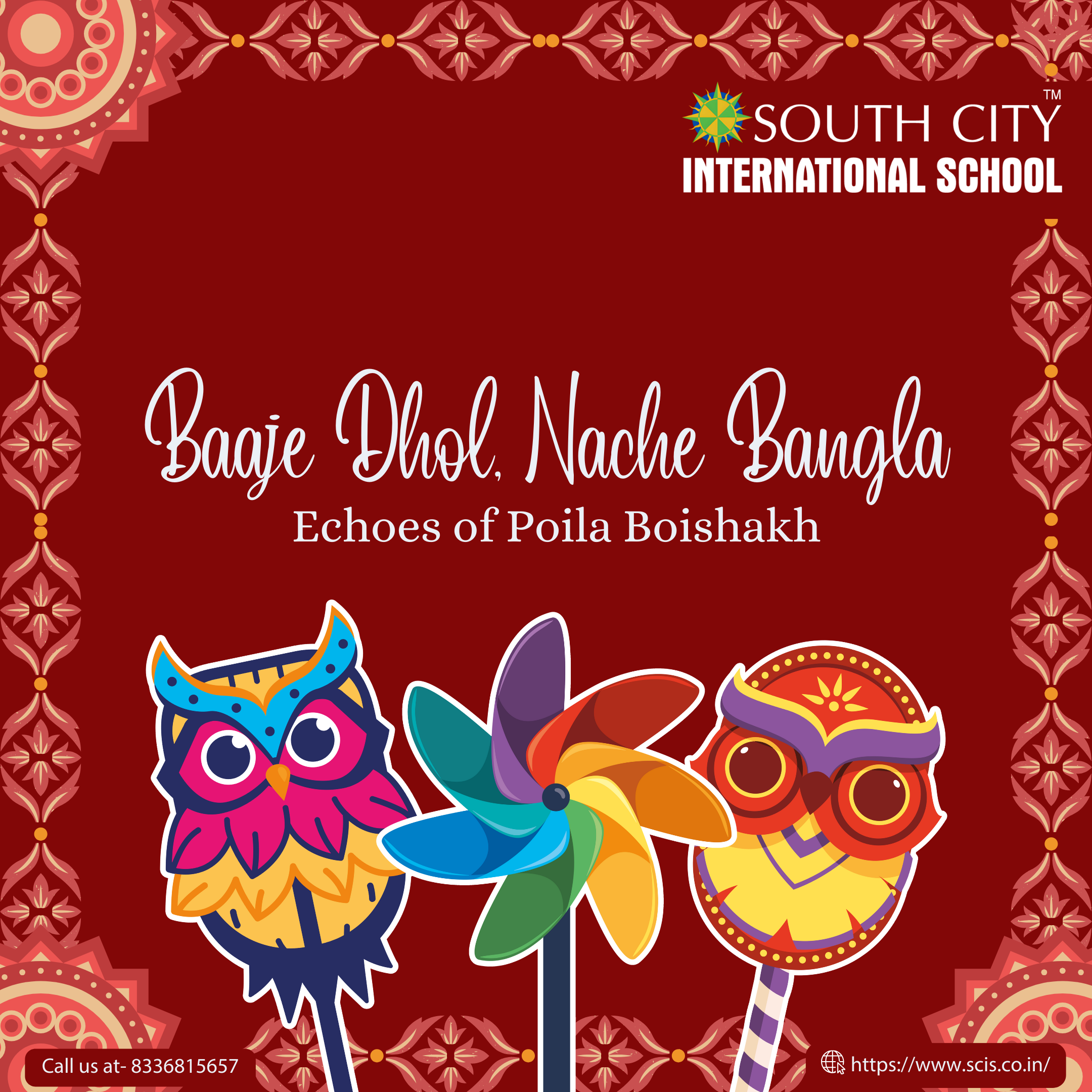South City International School

 17 Apr 2025
17 Apr 2025 Echoes of Poila Boishakh
“নিশি অবসানপ্রায়, ওই পুরাতন
বর্ষ হয় গত!
আমি আজি ধূলিতলে এ জীর্ণ জীবন
করিলাম নত।”
"The night is ending; the old year is passing away!
Today, I bow down to the dust with this worn-out life."
These lines by Rabindranath Tagore, penned in the poem Noboborshe from his collection Chitra, echo the spirit of Poila Boishakh, a power symbol of the farewell to the old and a soulful invitation to the new.
Every year, as mid-April approaches, Bengal prepares for this vibrant transition of not just of calendars, but of spirit, of memory and of collective joy. Poila Boishakh, the first day of the Bengali calendar, arrives like spring rain after a long drought, with drums that beat like hearts, with songs that ripple through alleys and courtyards and with a festive energy that awakens even the quietest of homes. It is a time when red and white are not just colours, but emotions and a symbol of purity wrapped in tradition, joy tied with roots.
Its origins take us back to the royal courts of the Mughal emperor Akbar, whose wisdom extended beyond battlefields into daily life. Faced with the difficulty of collecting taxes according to the lunar Hijri calendar, Akbar sought a system that would better align with the agricultural cycle. He commissioned his court astronomer, Fathullah Shirazi, to harmonize the solar Hindu calendar with the lunar Islamic one. Thus emerged the Fasholi Shan, also known as Tarikh-e-Elahi, which laid the foundation of the Bengali calendar, a practical innovation that has since blossomed into a celebration of culture, unity and timeless beauty.
On this day, the air is different. It carries the scent of incense and steaming rice, of mango blossoms and sandalwood. People rise with the sun to join the Prabhat Pheri, a processional celebration bursting with folk songs and joy, winding through lanes and bylanes like a river of hope. Clad in starched white sarees bordered with vermillion, women sway to the rhythm of dhols and ektaras, while men in crisp punjabis and dhotis sing with pride and nostalgia. Every footstep, every note, is a remembrance — of ancestry, of belonging, of Bengal.
Shops across the land open their haal khata, new ledgers marked with red ink and sweet beginnings. With rituals and blessings, businessmen seek fortune, while farmers offer prayers for a bountiful harvest. Children run about with colourful masks and candy in hand, while elders recount tales of their own childhoods — of kites, laughter and days when time seemed to pause on this very date.
The cuisine of the day is as much a ritual as the music. On banana leaves and brass plates, panta bhaat, cool, fermented rice, is served with fiery green chilies, onion slices and a drizzle of mustard oil. Alongside rests the prized ilish maach (hilsa fish) cooked to perfection in mustard gravy. Sweets like rosogolla, sandesh and mishti doi line trays and tables as their sweetness mirrors the love shared on this day. Every bite is a memory, every meal a thread in the fabric of Bengal.
As if food and music were not enough, the very streets turn into a theatre. In Bangladesh, the grand Mangal Shobhajatra takes center stage — a magnificent procession of oversized masks, handcrafted motifs, animal effigies and symbolic art that celebrates not just the new year but the indomitable spirit of the people. Recognized by UNESCO as an intangible cultural heritage, it is both a celebration and a statement — of resilience, of colour, of shared dreams.
Back in West Bengal, cities like Kolkata burst into life. Markets such as Gariahat and New Market buzz with eager shoppers buying sarees, kurta-pajamas, home décor and gifts for loved ones. Houses are adorned with intricate alpana designs drawn at dawn, with red and white patterns flowing like blessings across the floor. From balconies flutter red-rimmed garments and flowers, while music floats from every home, old gramophones mixing with Bluetooth speakers in a rare harmony of eras.
In this festival, there is space for both modern and ancient — a rare coexistence of the new and the eternal. Friends who haven’t spoken in years reconnect. Neighbours gather not over grievances but shared meals. There is a softness in the air, a joy without reason, a celebration without barriers.
Poila Boishakh is not just a date or a special day or an occasion to celebrate; it is a metaphor for life — its endings, its renewals, its small acts of beauty. It is the joy of buying a new notebook and imagining all the dreams that will be written within. It is the smile of a stranger on a crowded street. It is the silent gratitude for having made it through another year and the loud, joyful declaration that better days are coming.
And when all is said and sung, we return once again to the words of Tagore, who in his wisdom captured the fire of this day:
"মুছে যাক গ্লানি, ঘুচে যাক জরা, অগ্নিস্নানে শুচি হোক ধরা।"
"Let all blemishes be erased, let all decay be removed, let the earth be purified in the fire bath."
Shubho Noboborsho — may your year be filled with poetry, with purpose and with the music of a land that never forgets to sing.
 375, Prince Anwar Shah Road, Kolkata,
375, Prince Anwar Shah Road, Kolkata,  admissions@scis.co.in
admissions@scis.co.in
 info@scis.co.in
info@scis.co.in